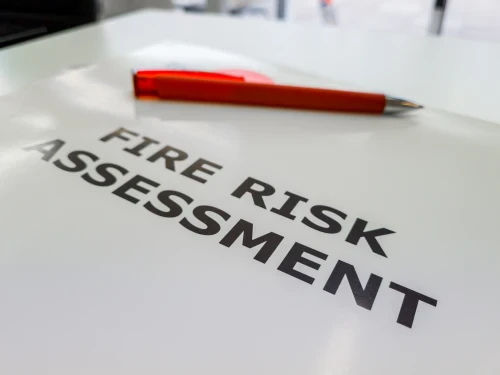Who Is Competent to Carry Out a Fire Risk Assessment?

As a responsible business or premises owner, deciding how to manage your fire risk assessment responsibilities is critical. It’s understandable that some organisations consider bringing FRA reviews in-house. On the surface, it may appear more cost-effective or convenient. However, fire safety is not an area where shortcuts or assumptions about competence can be safely made.
Here’s what you need to know before assigning this critical task internally.
Who Is “Competent” to Carry Out a Fire Risk Assessment?
The Regulatory Reform (Fire Safety) Order 2005 requires the Responsible Person to ensure a “suitable and sufficient” fire risk assessment is carried out. The term “competent” is defined in the Fire Sector Federation Approved Code of Practice - “A National Framework for Fire Risk Assessor Competency” as:
“A person, suitably trained and qualified by knowledge and practical experience, and provided with the necessary instructions, to enable the required task(s) to be carried out correctly”.
It’s not just about attending a short course or reading guidance. Competence requires a solid foundation of technical knowledge, practical experience, and sector-specific insight.
What Makes Someone Competent?
Competence is not a title it’s demonstrated through capability. According to the FSF Code of Practice, a competent fire risk assessor should have:
- Knowledge across 32 defined areas including fire behaviour, legislation, human factors, means of escape, passive and active protection, and fire safety management.
- Qualifications equivalent to European Qualifications Framework (EQF) Level 5 or above.
- Experience in conducting multiple fire risk assessments in similar premises types.
- The ability to communicate risk clearly and legally, in writing and in person.
- An ongoing commitment to Continuing Professional Development (CPD) committing to a minimum of 25 hours per year of structured learning is recommended.
For complex or high-risk premises (e.g., multi-occupied residential, healthcare, heritage, or high-rise buildings), even greater depth of understanding and experience is essential.
When to Seek a Specialist
You should seek a competent external assessor if:
- Your premises is classified as a high-risk building.
- You don’t have an in-house staff member who meets the qualification, experience, and CPD requirements outlined above.
- Your team lacks knowledge in sector-specific hazards (e.g., hospitals, schools, or special housing).
- There’s uncertainty around compliance with legislation or changes in fire safety guidance.
- Your risk assessment could be used as evidence in legal or enforcement action.
Making the Right Decision
When choosing how to conduct a fire risk assessment, the decision must be driven by one principle: demonstrable competence. While performing assessments internally is acceptable for organisations with verifiable expertise, this path should never be chosen simply to cut costs.
If you cannot provide definitive evidence of your team's competence, the law is clear. Engaging a specialist becomes essential to fulfil your legal duty and produce a suitable and sufficient fire risk assessment. A qualified external fire risk assessor provides more than just a document; they bring independence, objectivity, and specialised knowledge that is continuously upheld by professional accreditation and legal scrutiny.
How to Find a Competent Fire Risk Assessor
The FSF Code recommends using assessors who are:
- Individually certified by a UKAS-accredited body.
- Or employed by a company with third-party certification for fire risk assessments.
- Or registered with a professional body licensed by the Engineering Council.
- Or registered on a publicly accessible register (e.g., those maintained by BAFE SP205, IFE, or IFSM)
- Avoid relying solely on personal recommendations or assumptions about competence based on job titles or adjacent experience (e.g., health & safety advisors without dedicated fire training).
Need help reviewing your current fire risk assessment approach?
Our team is fully third-party certified under the BAFE SP205 scheme, highly experienced, and all of our Fire Risk Assessors are registered on the IFSM Tiered Fire Risk Assessor register. We are committed to making your compliance journey simpler and safer, so please feel free to reach out to us if you have any questions or queries. We are happy to help.
Latest News
- More Than a Match: Celebrating the Real Heroes at Goals4GOSH
- Who Is Competent to Carry Out a Fire Risk Assessment?
- Safe I.S. Ltd Awarded BAFE SP205 Life Safety Fire Risk Assessment Certification
- Goals4GOSH 2025 Main Event raises over £50,000
- Miles for Meaning: Support Safe I.S. Engineer Oscar Voller in the London Marathon for St Catherine's Hospice
- Safe I.S. Celebrates Re-Accreditation of Fire Warden Training by the IFE
- Christmas 2024 Opening Hours
- Safe I.S. Achieves NSI Gold
- Our Managing Director has been elected to the Fire Industry Association Services Council
- Our Business Development Manager has been elected to the Fire Industry Association Fire Risk Assessment Council
